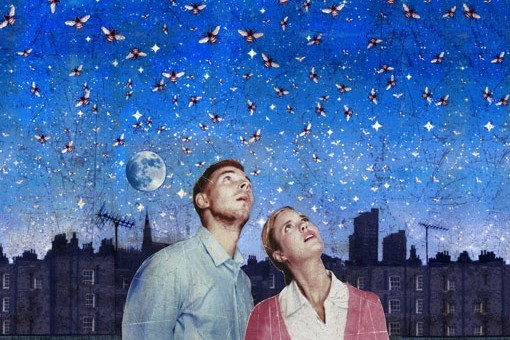“A change in formatting—from Normal to Bold, for instance—indicates a change in universe.”
So begins the script for Constellations, a play by Nick Payne which received its world premiere last winter at London’s Royal Court Theatre. The play tells the story—or perhaps, more accurately, stories—of Marianne, a quantum physicist, and Roland, a bee-keeper, and their love (or perhaps not) across the multiverse. In one 65-minute act, we experience every possible iteration of their relationship—they meet at a party when Roland is still in a relationship, and just out of a really serious relationship, and married, and single; and their first date goes horribly, and pretty well, and also just kind of fizzles, and they sleep together for the first time, and they don’t but they continue to date; and so on. Every possibility plays out in front of us.
As Marianne explains on at least one version of one of their first date:
“Every choice, every decision you’ve ever and never made exists in an unimaginably vast ensemble of parallel universes […] Let’s say that ours really is the only universe that exists. There’s only one unique me and one unique you. If that were true, then there could only ever really be one choice. But if every possible future exists, then the decisions we do and don’t make will determine which of these futures we actually end up experiencing.”
The concept of a multiverse and parallel realities is likely nothing new to science fiction fans, but what makes Constellations so compelling is its intimate approach to the vastness of the multiverse. There’s no struggle to save or destroy a certain timeline, no evil alternate twins, no Superboy punching a hole through reality, no train like in that the movie Sliding Doors. There’s just two people in a single space for one hour that spans every universal possibility. There aren’t even any specific scene breaks. Instead, the play jumps seamlessly between realities, rewinding moments to show how else they played out in another timeline, which makes the script incredibly interesting to read, even without seeing the play onstage. Sometimes it’s the very slightest change: “There’s no linear explanation I’m afraid” Marianne explains in one iteration, and “There’s no straightforward explanation I’m afraid” in another, for example. And so much of the thematic value of the play is contained in that slight semantic difference.
But even as timelines diverge, and Roland has an affair, or Marianne an affair, or meet at that party once upon a time and reconnect at a ballroom class, their lives continue to intertwine, and every minuscule distinction closes just as many doors for them as it opens. Did they meet at a wedding? Or was it a barbecue? Or was it both? Do they even know anymore? We don’t need epic, reality-smashing crossovers to follow the plot, because we’re so busy rooting for Roland and Marianne that maybe in this reality the timing will finally be right and they’ll get together and live happily and—okay so not in this one but in the next reality we see and—oh, wow, Roland’s kind of jerk this time—and so on. Even after we witness several different tragic endings for these reality-crossed lovers, we return yet again to an earlier moment, in another timeline, and we find ourselves filled with hope, that perhaps they’ll actually make it this time. As Marianne says towards the end of the play:
“The b-b-basic laws of physics don’t have a past and a present. Time is irrelevant at the level of a-atoms and molecules. It’s symmetrical. We have all the time we’ve always had. You’ll still have all our time . . . There’s not going to be any more or less of it. / Once I’m gone.”
The play is full of these kinds of poetic speeches that resonate with anyone who’s ever dealt with any kind of heartbreak. I’m sure we’ve all had times when we’ve thought “If only that one moment had happened this way instead . . . ” For Marianne and Roland, it does.
So far, the play has only been produced in London (I haven’t actually seen it myself), although supposedly there is a film adaptation in development. But with the magic of these parallel moments, I almost feel like a story such as this is meant for the intimacy of a small stage. If you’re interested, the script is also available for purchase. It’s a quick and beautiful read where one simple formatting change can change an entire universe.
Thom Dunn is a Boston-based writer, musician, homebrewer, and new media artist. He enjoys Oxford commas, metaphysics, and romantic clichés (especially when they involve robots). He firmly believes that Journey’s “Don’t Stop Believing” is the single worst atrocity committed against mankind. Find out more at thomdunn.net.










